Module 1 Unit 1 Relatives in Beijing Listening and speaking Planning a trip to Beijing课件 +嵌入音频(共16张
文档属性
| 名称 | Module 1 Unit 1 Relatives in Beijing Listening and speaking Planning a trip to Beijing课件 +嵌入音频(共16张 |
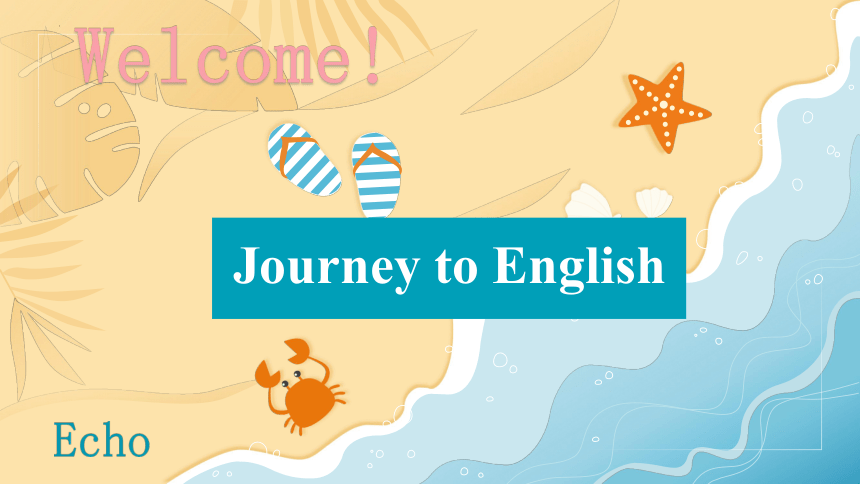
|
|
| 格式 | pptx | ||
| 文件大小 | 2.5MB | ||
| 资源类型 | 教案 | ||
| 版本资源 | 牛津上海版(试用本) | ||
| 科目 | 英语 | ||
| 更新时间 | 2024-03-21 18:17:55 | ||
图片预览

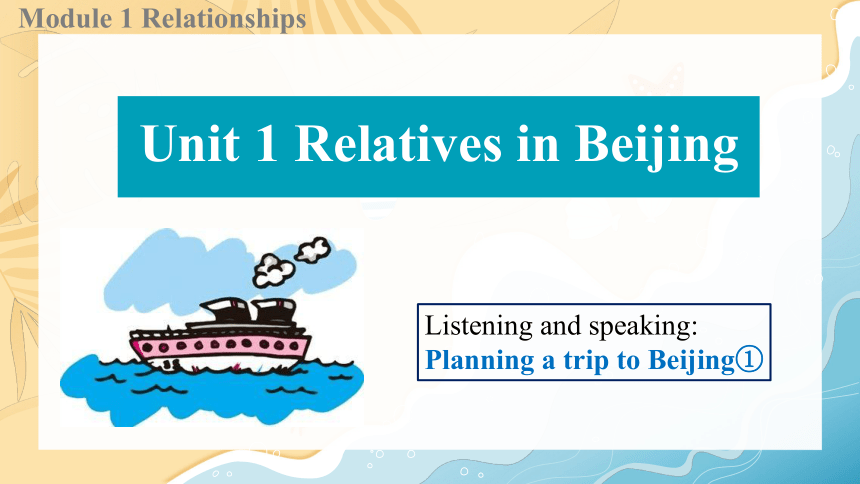
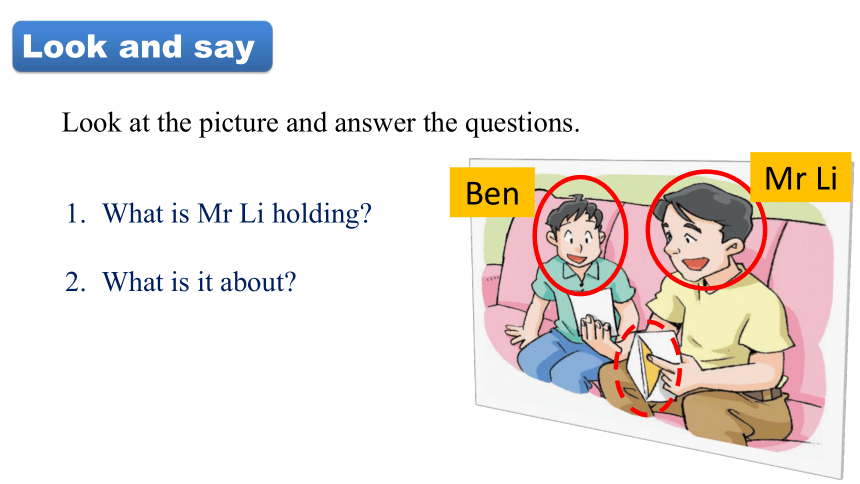
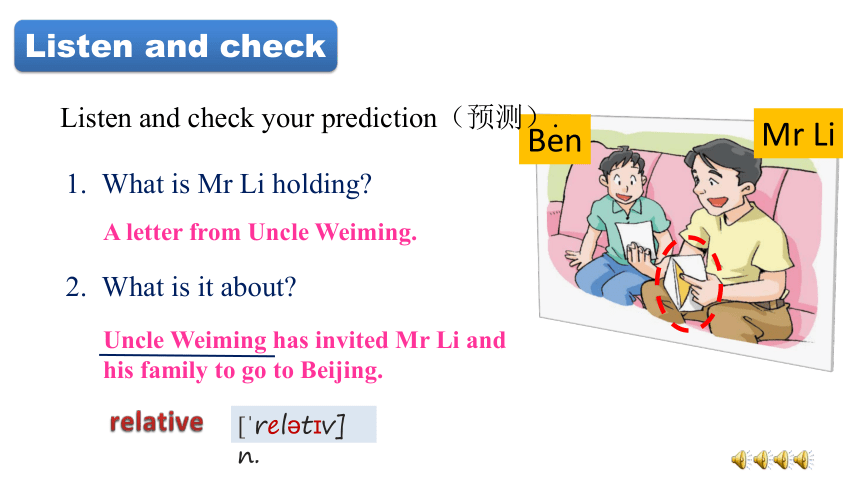
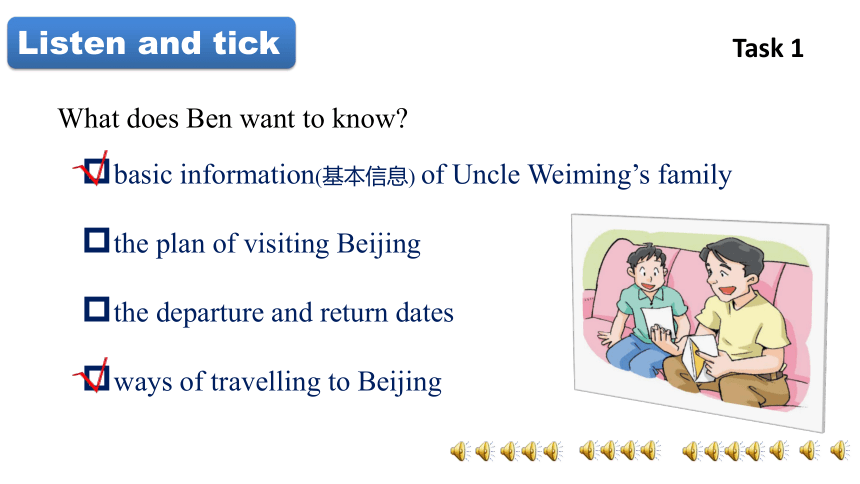
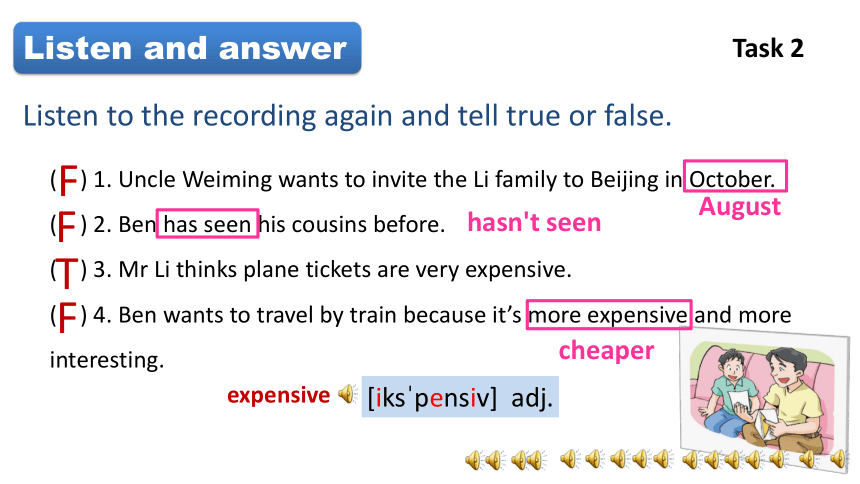
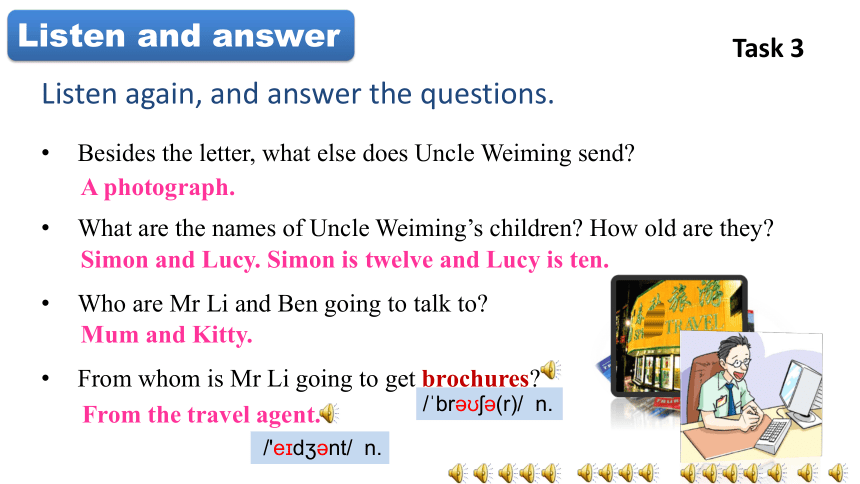
文档简介
(共16张PPT)
Journey to English
Welcome!
Echo
Unit 1 Relatives in Beijing
Listening and speaking: Planning a trip to Beijing①
Module 1 Relationships
Look and say
Ben
Mr Li
Look at the picture and answer the questions.
What is Mr Li holding
What is it about
Listen and check
Ben
Mr Li
Listen and check your prediction(预测).
What is Mr Li holding
What is it about
A letter from Uncle Weiming.
Uncle Weiming has invited Mr Li and his family to go to Beijing.
relative
[ rel t v] n.
Listen and tick
What does Ben want to know
basic information(基本信息) of Uncle Weiming’s family
the plan of visiting Beijing
the departure and return dates
ways of travelling to Beijing
Task 1
( ) 1. Uncle Weiming wants to invite the Li family to Beijing in October.
( ) 2. Ben has seen his cousins before.
( ) 3. Mr Li thinks plane tickets are very expensive.
( ) 4. Ben wants to travel by train because it’s more expensive and more
interesting.
Listen and answer
Listen to the recording again and tell true or false.
F
F
F
T
August
hasn't seen
cheaper
[iks pensiv] adj.
expensive
Task 2
Besides the letter, what else does Uncle Weiming send
What are the names of Uncle Weiming’s children How old are they
Who are Mr Li and Ben going to talk to
From whom is Mr Li going to get brochures
Listen and answer
Listen again, and answer the questions.
A photograph.
Simon and Lucy. Simon is twelve and Lucy is ten.
Mum and Kitty.
From the travel agent.
/ br (r)/ n.
/'e d nt/ n.
Task 3
Look, Ben. I’ve got a letter from Uncle Weiming.
He lives in Beijing. He has invited us to stay with his family in August.
[ n va t] v.
invite
invitation
[ nv te n] n.
Listen and repeat
I haven’t seen my cousins before.
Your uncle has sent us a photograph. These are your cousins, Simon and Lucy.
How old are they
Simon is twelve and Lucy is ten.
Are we going to travel to Beijing by plane
Perhaps, but plane tickets are very expensive.
Let’s go by train. It’s cheaper and more interesting.
That’s a good idea. Let’s talk to Mum and Kitty. I’m going to get some brochures from the travel agent.
He has invited us to stay with his family in August.
I haven’t seen my cousins before.
Your uncle has sent us a photograph.
(1) He ________ already___________(do) his homework.
(2) I ___________________ this film twice (see).
(3) —— _______ you _____ (have) your breakfast yet
—— Yes, I .
No, I .
has
done
have seen
Have
had
have
haven’t
Find out these sentences:
present perfect tense(现在完成时)
构成:
have/has+过去分词
Look, read and answer
Kitty is asking Ben some questions about the photograph.
Here’s a photograph from Uncle Weiming. We’re going to visit his family soon.
[su n] adv.
Ben
Kitty
Uncle Weiming lives in Beijing.
We are going to visit him in August.
We have two cousins, Simon and Lucy.
1 Where does uncle Weiming live
2 When are we going to visit him
3 What are the names of our cousins
4 How old are they
Simon is twelve and lucy is ten.
(根据Ben的回答,完成对话)
Complete the conversation based on what Ben says.
wh- questions
falling tone
Mr Li: Look, Ben. I‘ve got a letter _______ Uncle Weiming.He lives in Beijing.
He has ________ us to stay with his family in August.
Ben: I haven't __________ my cousins before.
Mr Li: Your uncle has _____ us a photograph.
These are your cousins, Simon and Lucy.
Ben: How old are they
Mr Li: Simon is twelve and Lucy is ten.
Ben: Are we going to travel to Beijing by plane
Mr Li: _________, but plane tickets are very ____________.
Ben: Let's go by train. It's cheaper and more _____________.
Mr Li: That's a good idea. Let's talk ____ Mum and Kitty.
I'm going to get some ___________ from the travel _________.
from
invited
seen
sent
Perhaps
expensive
interesting
brochures
agent
to
Pair work: Role play the dialogue.
Task 4
形容词比较级与最高级变化规则(记在笔记本上)
1.一般单音节在词尾加er(long—longer, cheap--cheaper)
2.以不发音的字母e结尾的加r (late—later, nice-nicer)
3.以重读闭音节结尾的词,而词尾只有一个辅音字母时,
先双写这一辅音字母,再加er (hot—hotter, big--bigger)
4.以辅音字母加y结尾的双音节词先变y为i再加er
(happy—happier, heavy-heavier)
5.多音节词在词前加more
(quickly--more quickly, interesting--more interesting)
6.另外还有一些不规则变化 (good—better, many/much--more)
Journey to English
Welcome!
Echo
Unit 1 Relatives in Beijing
Listening and speaking: Planning a trip to Beijing①
Module 1 Relationships
Look and say
Ben
Mr Li
Look at the picture and answer the questions.
What is Mr Li holding
What is it about
Listen and check
Ben
Mr Li
Listen and check your prediction(预测).
What is Mr Li holding
What is it about
A letter from Uncle Weiming.
Uncle Weiming has invited Mr Li and his family to go to Beijing.
relative
[ rel t v] n.
Listen and tick
What does Ben want to know
basic information(基本信息) of Uncle Weiming’s family
the plan of visiting Beijing
the departure and return dates
ways of travelling to Beijing
Task 1
( ) 1. Uncle Weiming wants to invite the Li family to Beijing in October.
( ) 2. Ben has seen his cousins before.
( ) 3. Mr Li thinks plane tickets are very expensive.
( ) 4. Ben wants to travel by train because it’s more expensive and more
interesting.
Listen and answer
Listen to the recording again and tell true or false.
F
F
F
T
August
hasn't seen
cheaper
[iks pensiv] adj.
expensive
Task 2
Besides the letter, what else does Uncle Weiming send
What are the names of Uncle Weiming’s children How old are they
Who are Mr Li and Ben going to talk to
From whom is Mr Li going to get brochures
Listen and answer
Listen again, and answer the questions.
A photograph.
Simon and Lucy. Simon is twelve and Lucy is ten.
Mum and Kitty.
From the travel agent.
/ br (r)/ n.
/'e d nt/ n.
Task 3
Look, Ben. I’ve got a letter from Uncle Weiming.
He lives in Beijing. He has invited us to stay with his family in August.
[ n va t] v.
invite
invitation
[ nv te n] n.
Listen and repeat
I haven’t seen my cousins before.
Your uncle has sent us a photograph. These are your cousins, Simon and Lucy.
How old are they
Simon is twelve and Lucy is ten.
Are we going to travel to Beijing by plane
Perhaps, but plane tickets are very expensive.
Let’s go by train. It’s cheaper and more interesting.
That’s a good idea. Let’s talk to Mum and Kitty. I’m going to get some brochures from the travel agent.
He has invited us to stay with his family in August.
I haven’t seen my cousins before.
Your uncle has sent us a photograph.
(1) He ________ already___________(do) his homework.
(2) I ___________________ this film twice (see).
(3) —— _______ you _____ (have) your breakfast yet
—— Yes, I .
No, I .
has
done
have seen
Have
had
have
haven’t
Find out these sentences:
present perfect tense(现在完成时)
构成:
have/has+过去分词
Look, read and answer
Kitty is asking Ben some questions about the photograph.
Here’s a photograph from Uncle Weiming. We’re going to visit his family soon.
[su n] adv.
Ben
Kitty
Uncle Weiming lives in Beijing.
We are going to visit him in August.
We have two cousins, Simon and Lucy.
1 Where does uncle Weiming live
2 When are we going to visit him
3 What are the names of our cousins
4 How old are they
Simon is twelve and lucy is ten.
(根据Ben的回答,完成对话)
Complete the conversation based on what Ben says.
wh- questions
falling tone
Mr Li: Look, Ben. I‘ve got a letter _______ Uncle Weiming.He lives in Beijing.
He has ________ us to stay with his family in August.
Ben: I haven't __________ my cousins before.
Mr Li: Your uncle has _____ us a photograph.
These are your cousins, Simon and Lucy.
Ben: How old are they
Mr Li: Simon is twelve and Lucy is ten.
Ben: Are we going to travel to Beijing by plane
Mr Li: _________, but plane tickets are very ____________.
Ben: Let's go by train. It's cheaper and more _____________.
Mr Li: That's a good idea. Let's talk ____ Mum and Kitty.
I'm going to get some ___________ from the travel _________.
from
invited
seen
sent
Perhaps
expensive
interesting
brochures
agent
to
Pair work: Role play the dialogue.
Task 4
形容词比较级与最高级变化规则(记在笔记本上)
1.一般单音节在词尾加er(long—longer, cheap--cheaper)
2.以不发音的字母e结尾的加r (late—later, nice-nicer)
3.以重读闭音节结尾的词,而词尾只有一个辅音字母时,
先双写这一辅音字母,再加er (hot—hotter, big--bigger)
4.以辅音字母加y结尾的双音节词先变y为i再加er
(happy—happier, heavy-heavier)
5.多音节词在词前加more
(quickly--more quickly, interesting--more interesting)
6.另外还有一些不规则变化 (good—better, many/much--more)
同课章节目录
- Module 1 Relationships
- Unit 1 Relationships in beijing
- Unit 2 Our animal friends
- Unit 3 Friends from other countries
- Module 2 My Neighborhood
- Unit 4 Jobs people do
- Unit 5 Choosing a new flat
- Unit 6 Different places
- Unit 7 Signs around us
- Module 3 Diet and health
- Unit 8 Growing healthy,growing
- Unit 9 International Food Festival
- Unit 10 A birthday party
- Unit 11 My food project
